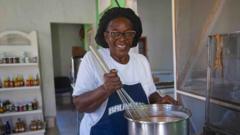The addition not only celebrates attiéké but also underscores its cultural significance and economic impact in Ivory Coast.
**Attiéké: Ivory Coast's Culinary Treasure Receives UNESCO Recognition**

**Attiéké: Ivory Coast's Culinary Treasure Receives UNESCO Recognition**
Ivory Coast's cherished dish attiéké, made from cassava, honored as UNESCO intangible cultural heritage.
In a momentous achievement for Ivory Coast, the country's beloved culinary staple, attiéké, has been officially recognized as an intangible cultural heritage by UNESCO. This cherished dish, which is made from fermented cassava flour and is popularly known as "Ivorian couscous," is traditionally served with grilled fish and has found its way into the daily meals of many Ivorians, appearing at breakfast, lunch, and dinner.
UNESCO's designation was announced during the 19th session focused on safeguarding intangible cultural heritage in Paraguay, with Ivory Coast's UNESCO delegate, Ramata Ly-Bakayoko, emphasizing the deep-rooted nature of attiéké in the daily lives and traditions of its communities.
Originating from the coastal regions of Ivory Coast several centuries ago, attiéké has not only become a significant part of local diets but has also transcended borders to gain popularity across West Africa. As a centerpiece of various ceremonies—ranging from weddings and baptisms to community meetings—attiéké represents more than just food; it is a vital source of livelihood, particularly for women and girls, who traditionally engage in its production.
Making attiéké is a complex process, involving several traditional steps, from peeling and grating cassava to pressing, drying, and steaming the pulp. This artisanal skill is passed from generation to generation, fostering a strong cultural connection and imparting a deep sense of identity within the community.
The importance of attiéké extends beyond culinary delight to embody the ethos of unity and heritage. Institutions like UNESCO highlight the need to protect such intangible cultural practices, ensuring they are preserved for future generations. The inclusion of attiéké on UNESCO's list raises awareness of its significance to global culture.
Despite its recognition, attiéké has not been without controversy. An incident in 2019 sparked outrage when a Burkinabé entrepreneur won an agricultural award for his attiéké product, provoking a backlash among Ivorians feeling protective of their national dish. Efforts have been made by the African Regional Intellectual Property Organization to safeguard the attiéké name, akin to how "Champagne" is reserved for specific French products.
As attiéké secures its place in the spotlight, it not only celebrates the rich culinary legacy of Ivory Coast but also underscores the collective responsibility of preserving cultural heritage in a rapidly changing world.
UNESCO's designation was announced during the 19th session focused on safeguarding intangible cultural heritage in Paraguay, with Ivory Coast's UNESCO delegate, Ramata Ly-Bakayoko, emphasizing the deep-rooted nature of attiéké in the daily lives and traditions of its communities.
Originating from the coastal regions of Ivory Coast several centuries ago, attiéké has not only become a significant part of local diets but has also transcended borders to gain popularity across West Africa. As a centerpiece of various ceremonies—ranging from weddings and baptisms to community meetings—attiéké represents more than just food; it is a vital source of livelihood, particularly for women and girls, who traditionally engage in its production.
Making attiéké is a complex process, involving several traditional steps, from peeling and grating cassava to pressing, drying, and steaming the pulp. This artisanal skill is passed from generation to generation, fostering a strong cultural connection and imparting a deep sense of identity within the community.
The importance of attiéké extends beyond culinary delight to embody the ethos of unity and heritage. Institutions like UNESCO highlight the need to protect such intangible cultural practices, ensuring they are preserved for future generations. The inclusion of attiéké on UNESCO's list raises awareness of its significance to global culture.
Despite its recognition, attiéké has not been without controversy. An incident in 2019 sparked outrage when a Burkinabé entrepreneur won an agricultural award for his attiéké product, provoking a backlash among Ivorians feeling protective of their national dish. Efforts have been made by the African Regional Intellectual Property Organization to safeguard the attiéké name, akin to how "Champagne" is reserved for specific French products.
As attiéké secures its place in the spotlight, it not only celebrates the rich culinary legacy of Ivory Coast but also underscores the collective responsibility of preserving cultural heritage in a rapidly changing world.


















